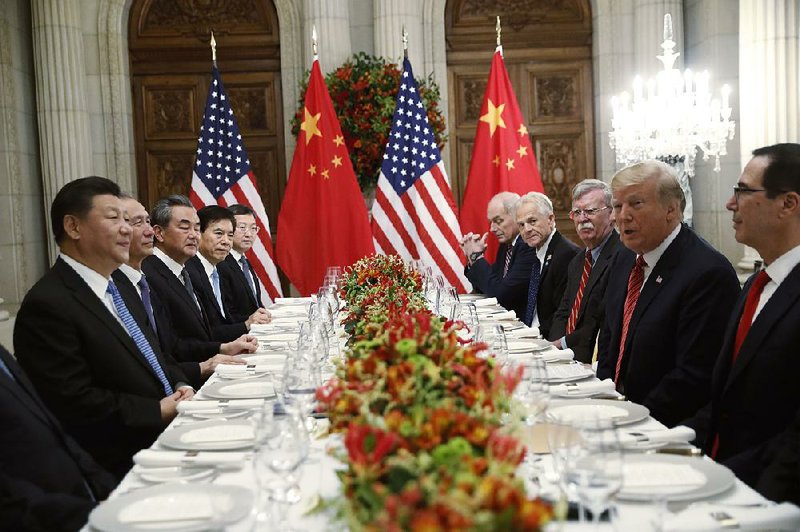BEIJING -- U.S. and Chinese trade negotiators are discussing ways to resolve disputes ahead of a meeting between Presidents Donald Trump and Xi Jinping at the Group of 20 summit in Japan later this week, a Chinese official said Monday.
Wang Shouwen, a Commerce Ministry vice minister, told reporters that the sides were seeking to "consolidate the important consensus reached between the two leaders" in a telephone call last week. Wang gave no details about specific issues under discussion.
This week's G-20 meeting in Osaka is the first opportunity Trump and Xi have had to discuss the trade dispute face to face since Trump said he was preparing to target the $300 billion in Chinese imports that he hasn't already hit with tariffs, extending them to everything China ships to the United States.
Trump has already imposed 25% tariffs on $250 billion in Chinese imports, and China has retaliated with tariffs on U.S. goods.
The two sides have held 11 rounds of talks but have not overcome U.S. concerns over China's acquisition of American technology and its sizable trade surplus. China denies forcing U.S. companies to hand over trade secrets and says the surplus is much smaller than it appears, once the trade in services and the value extracted by U.S. companies are taken into account.
Stepping up the pressure on Beijing, the U.S. Commerce Department has effectively barred American companies from selling or transferring technology to Huawei Technologies, the world's biggest maker of network gear, the No. 2 smartphone manufacturer and a champion of Chinese industry.
The U.S. says Huawei poses a national security threat because it may be beholden to China's ruling Communist Party. However, American officials have presented no evidence of any Huawei equipment intended to serve as conduits for espionage by Beijing.
The company's placement on the U.S. government's Entity List is widely seen as a move to persuade resistant American allies in Europe to exclude Huawei equipment from their next-generation wireless networks, known as 5G.
Responding to a question about whether it would be best for all 5G devices sold in the U.S. to have been made outside China, Chinese Foreign Ministry spokesman Geng Shuang said Americans seemed to be conjuring up nonexistent threats.
"I want to tell individuals in the U.S. that they have been living in a panic made by themselves, and they have reached a state of extreme nervousness in which they even apprehend danger in every sound," Geng said.
Globalization has brought an "unprecedented" level of division of labor across borders and societies, reducing the significance of where products are manufactured and assembled, Geng said.
"Against such a backdrop, any attempt to achieve 'absolute security and controllability' by isolating oneself is nothing but fool's talk," Geng said.
China has responded to U.S. pressure by saying it would issue a list of "unreliable entities" targeting companies that "violated market principles" and cut supplies of components to Chinese businesses for noncommercial reasons.
Beijing has also suggested it might limit exports of minerals such as lithium that are used in many products including cellphones, electric vehicles and the batteries that run them.
The U.S. has taken steps to ease tensions in recent days, such as postponing a planned speech by Vice President Mike Pence on human rights in China, but mounting strategic disputes have tempered expectations for a trade breakthrough. The China Daily, a state-run English-language newspaper, said in an editorial Sunday that "for such a meeting at such a point, course-setting is probably more important than any specifics."
Meanwhile, China's Foreign Ministry said at a separate briefing that Memphis-based FedEx Corp. needed to better explain its errors with packages related to Huawei. In the latest case, the shipping company said it made a mistake last week by rejecting the shipment of one of the Chinese company's phones to the U.S. from the U.K.
"The U.S. government has been trumping up charges to abuse national security and employing state power to clamp down on a Chinese company," Geng said Monday at a regular news briefing in Beijing. "That is the root cause of the problem. U.S. bullying has hurt Chinese companies and U.S. companies. It affects normal operations of businesses and disrupts normal cooperation."
Another sticking point between the two countries could be Hong Kong, where protests against a Beijing-backed extradition bill have prompted U.S. legislation to revisit the former British colony's special trading status. Activists have announced a "G-20 Free Hong Kong rally" on Wednesday in an attempt to put the issue on the summit's agenda.
Information for this article was contributed by Christopher Bodeen of The Associated Press and by staff members of Bloomberg News.
Business on 06/25/2019
